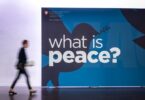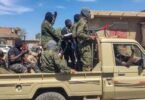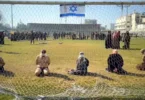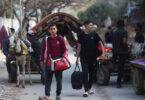Yossi Mekelberg
On two consecutive Saturday nights this month I had the privilege of witnessing firsthand the protests against the anti-democratic measures the Israeli government is attempting to inflict on its political system and society.
The protests have proved to be an authentic celebration, by ordinary Israelis from all walks of life, of their desire for their country to remain a true liberal, democratic state. The protesters displayed the gravity and determination this crisis requires — but there was also a real sense of carnival and a huge age range of people on the street, from young children to those who witnessed Israel’s birth as an independent state 75 years ago in the hope that their new country would be able to square the complex circle of being both Jewish and democratic.
The speakers at these massive rallies are selected carefully to represent a wide range of citizens, from the more liberal/left-leaning progressives to the democratic elements on the right, and to reflect the country’s diversity of age, social status and gender. They have included politicians, academics and senior representatives of security forces and civil society. You name it, it is represented here, and it is all impressively overseen by the towering figure of Shikma Bressler, a physicist by trade but a leader by nature.
Nevertheless, there continues to be something that is disturbingly missing from these protests, and it is something that is crucial for any discussion of the Jewish and democratic nature of the state: The issue of Israel’s relations with the Palestinians, especially those who live under Israeli occupation and blockade in the West Bank and Gaza, but also, to a large extent, the Palestinian minority within Israel proper.
Granted there are some banners to be seen here and there, and someone might be spotted wearing a T-shirt with a slogan that asserts there can be “No Democracy With Occupation.” But such things are few and far between and the issue is entirely absent from the speeches.
I keep being told how wrong it is to make the connection between the constant erosion of Israeli democratic rights and the actions of the state in depriving its next-door neighbors of those very same rights.
This must either be because, somehow, there are those who suffer from a total eclipse of judgment and are incapable of seeing this direct connection with the occupation and the institutional discrimination against the Palestinian minority inside Israel; or for tactical reasons, to avoid weakening the protest movement by deterring those who might oppose the government’s judicial coup but are no fans of a two-state solution — or any other solution that would grant equal rights to Palestinians.
To be fair, as much as I am at a loss to understand those who fail to comprehend the obvious link between brutally depriving millions of people of their most basic political, civil and human rights — people they can see every day with their naked eyes from their windows and backyards — and the constant erosion of the democratic system in Israel itself, I do have some sympathy for the argument about saving democracy first and ending the occupation second.
Nevertheless, I reject that view. It is a short-sighted, immoral and rather cowardly argument that refuses to understand that democracy is first and foremost about a set of values and rights that cannot be handed to some people and not to others. It, arrogantly, once again asks the Palestinians to be patient, to allow their Israeli neighbors, who happen also to be their occupiers, to sort out their own affairs and only then, by their grace, will they, perhaps, apply themselves to solving that conflict. In the meantime, Palestinians are expected to carry on enduring their dire and unjust conditions.
Instead of progress toward peace, all Palestinians see is the constant expansion of Jewish settlements as their land is taken over, harsh living conditions, and daily brutality by the occupying force.
So what exactly is the prognosis here? How much longer are Palestinians supposed to wait until Israelis find the time to afford them similar rights to those they themselves have enjoyed since 1948?
The sense of urgency and the threat to the very foundations of the democratic system in Israel that the proposed legislation has engendered needs very little explanation. It would self-evidently hand most of the power to politicians, over and above the rule of law, and is a sure path to a corrupt, populist and authoritarian system of governance.
This makes paramount the need for a wider, values-based discussion, one that is courageous enough to also examine the impact that decades of violently depriving another people of their rights has had on Israeli society.
The very essence of a democracy, as defined by the UN, is to uphold “the values of freedom, respect for human rights and the principle of holding periodic and genuine elections by universal suffrage. In turn, democracy provides an environment for the protection and effective realization of human rights.”
None of these principles is currently applicable to the lives of Palestinians, whether they are governed by Israel, by the Palestinian Authority or by Hamas.
The institutions and individuals who are in charge of ensuring democracy on the Israeli side of the Green Line are those same institutions and individuals who continue to sanction the violation of the same rights on the other side of the line, where Palestinians live. The sanctity of preserving and promoting the dignity of all, of respecting freedom of opinion and expression, and of freedom of association, access to power and exercising it within the rule of law, is not being bestowed on Palestinians, who live under occupation. Israel’s government and courts hold the two populations to completely different legal and moral standards.
There is a long litany of issues in which Israelis, on either side of the Green Line, are treated completely differently from Palestinians living under occupation. Such issues can range from the very basic rights of freedom of movement and speech, to the seizure and demolition of houses belonging to the blameless families of Palestinian terrorists, but not the houses of the families of Jewish terrorists. Just to be clear and ensure I do not give the wrong impression, such measures should not be taken in either case.
The occupation has normalized and legitimized violence as a tool to resolve political differences and contaminated the public discourse with utter toxicity. And while the deterioration of Israel’s democracy has been a gradual one, Prime Minister Benjamin Netanyahu and far-right politicians, with the support of the ultra-orthodox, have been waiting all along for the opportunity to introduce the spirit of the occupation into the way they govern within Israel proper, and to strip the Supreme Court of all its powers.
The current widespread protests might well halt, or even reverse this plot, but without ending both the occupation and practice of controlling by completely different rules millions of Palestinians, these anti-democratic tendencies will only continue to haunt Israelis.







